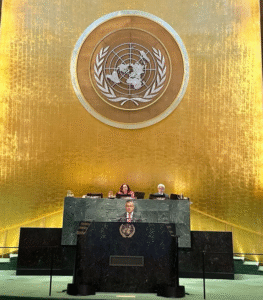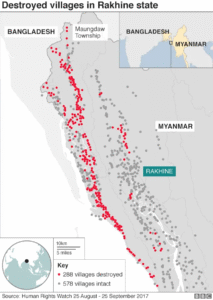Credit: James Shwe
Based on an analysis of the EU’s statement at the UN High-Level Conference on Rohingya, it’s clear that the core principles long advocated by Laetitia van den Assum were significantly reflected. She articulated these positions in several recent, publicly available forums leading up to the conference.
Laetitia van den Assum’s Recent Recommendations and Publications
In the weeks and months prior to the September 30, 2025, UN conference, Laetitia van den Assum, a former Dutch diplomat and member of the Rakhine Advisory Commission, actively published and spoke on the Rohingya crisis. Her key recommendations were detailed in:
• An analysis titled “Rohingya and Arakan: From Humanitarian Crisis to Comprehensive Solutions,” published on the Against Inhumanity platform on September 25, 2025.
• Her participation as a key speaker at the “Workshop on an Alternative Strategy for Rohingya Refugees” on September 5, 2025. This event was organized by United Against Inhumanity (UAI) specifically to develop and provide policy options for the UN conference.
• Ongoing commentary and interviews, such as a detailed conversation with the Refugee Law Initiative published in early 2024, where she outlined her consistent, long-term views on the crisis.
In these forums, her main arguments centered on moving beyond short-term aid to a comprehensive solution focused on rights, accountability, and sustainability.
Adoption of Recommendations in the EU Speech
The EU’s speech at the conference mirrored these recently articulated points closely, indicating a strong alignment with the expert consensus van den Assum represents:
Laetitia van den Assum’s Recommendation How It Was Reflected in the EU Speech
Address Root Causes The speech directly called for addressing the “root causes of displacement, including statelessness, denial of citizenship, and systemic discrimination”.
Ensure Safe and Dignified Return
The EU took a “clear stance against measures that could lead to premature repatriation” unless conditions are “safe, voluntary, dignified and sustainable”.
Pursue Accountability The statement commended the work of the ICJ and ICC and insisted that “those responsible must be held to account” to break the cycle of impunity.
Foster Self-Reliance The speech highlighted the need for Rohingya refugees to be given “appropriate skills and capacities which can be used to sustain a decent and dignified life”.
Promote International Burden-Sharing Acknowledging the strain on Bangladesh, the EU encouraged “additional partners to step up contributions” to the humanitarian response.
While the EU speech adopted the substance of these expert recommendations, it did not mention Laetitia van den Assum by name. Furthermore, while the speech noted that desperation was leading some Rohingya to join “armed groups,” it stopped short of naming any specific factions, keeping its primary focus on the accountability of the Myanmar military and a general call for “all parties” to respect international law.
EU Statement
Excellencies,
I am honoured to deliver this statement on behalf of the European Union and its Member States.
The Candidate Countries North Macedonia*, Montenegro*, Albania*, Ukraine, the Republic of Moldova, Bosnia and Herzegovina* and the EFTA country Iceland member of the European Economic Area, as well as Andorra, Monaco and San Marino align themselves with this statement.
It has now been eight long years since the actions of the Myanmar military caused the mass displacement of Rohingya people – eight years of uprooted lives, lost homes, and shattered hopes.
The humanitarian and security situation continues to deteriorate in Myanmar, with escalating conflict compounding the suffering of the Rohingya and other vulnerable minorities. This year alone, over 150 000 Rohingya were forced to flee to Bangladesh. Thousands of others undertook perilous sea journeys. Many died trying to flee.
Bangladesh’s generosity in providing shelter and safety to over 1.1 million Rohingya refugees is commendable and saves lives. Yet, prospects for a durable solution remain distant.
This High-Level Conference is therefore both important and timely. It is a much-needed occasion to renew global attention to the plight of the Rohingya and other vulnerable minorities who have suffered immensely in Myanmar’s protracted crisis.
The European Union and its Member States remain deeply concerned about the dire humanitarian situation in Rakhine State. Restricted humanitarian access continues to exacerbate suffering and risks pushing vulnerable populations toward famine and malnutrition. We strongly call on all parties, especially the Myanmar military, to immediately grant full, safe, and unhindered access for humanitarian actors to deliver life-saving assistance.
We strongly condemn the ongoing violence and grave human rights violations and abuses in Myanmar. All attacks against the civilian population must cease immediately. Myanmar must return to a democratic path, respecting the will and aspirations of its people. We call on the military to immediately cease indiscriminate aerial bombings, which are blatant violations of international humanitarian law. The Rohingya refugee crisis cannot be solved without addressing Myanmar’s wider crisis in a comprehensive and holistic manner.
In this regard, we support the ASEAN’s efforts towards achieving the Five Points Consensus, including most notably the cessation of all violence and the launch of an inclusive political dialogue to seek a peaceful solution in the interests of the people.
We take a clear stance against measures that could lead to premature repatriation of Rohingya refugees in conditions that are not safe, voluntary, dignified and sustainable. The European Union and its Member States remain committed to helping establish the conditions necessary for the return of the Rohingya to Myanmar. These conditions require addressing the root causes of displacement, including statelessness, denial of citizenship, and systemic discrimination.
The international community must sustain and scale up its support. Since 2017, the EU has committed over half a billion euro in humanitarian and development assistance for the Rohingya crisis in Myanmar, Bangladesh, and the region. But more is needed. We encourage additional partners to step up contributions. A more efficient, sustainable and comprehensive humanitarian and development-oriented response to the refugee crisis is needed. It is more critical than ever to find ways of providing the Rohingya refugees in Bangladesh with the appropriate skills and capacities which can be used to sustain a decent and dignified life until and upon their return.
Waning international support risks fuelling tensions among refugees and also between host communities and refugees in Bangladesh. Aid cuts deepen desperation and some Rohingya, including minors, are joining armed groups, further destabilising an already fragile region. Preventing further radicalisation and instrumentalisation of Rohingya requires urgent, concrete action that offers young people peaceful and viable alternatives.
Myanmar suffers from a lack of accountability and the perpetuation of impunity. We commend the work of the Independent, Investigative Mechanism for Myanmar, the International Criminal Court, and the International Court of Justice for pursuing accountability efforts to bring justice to the victims of atrocity crimes. To break the circle of impunity, those responsible must be held to account.
The Rohingya and other minorities deserve a future in Myanmar that guarantees their dignity, safe return, full citizenship and equal rights. While a comprehensive solution may take time, immediate steps are essential: we urge all parties to respect international law and international humanitarian law, especially in relation to the protection of civilians.
This is not a “nice to have”. It is a must-have and an international legal obligation.
Thank you.






